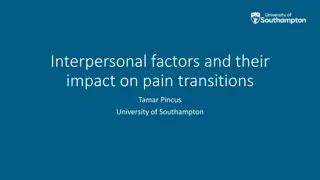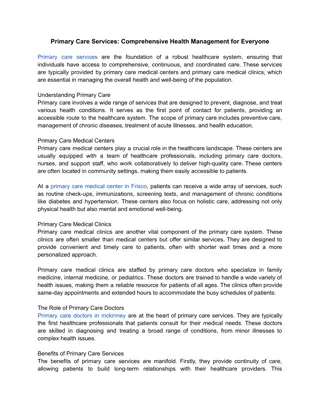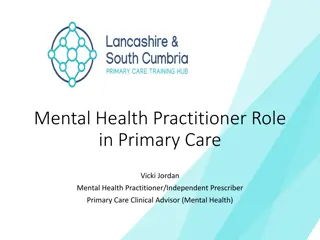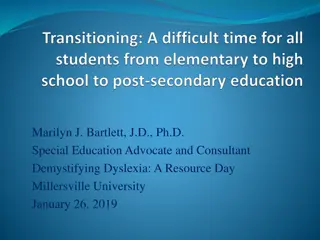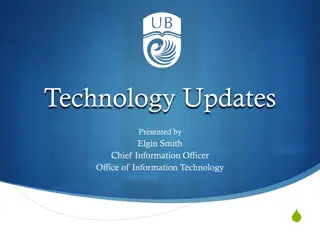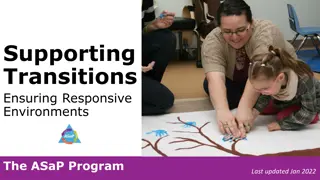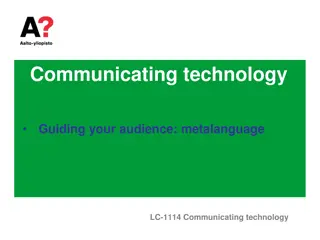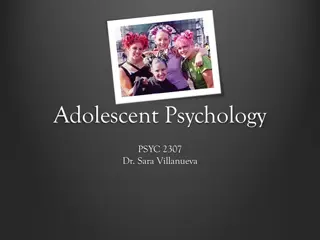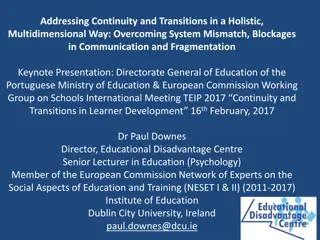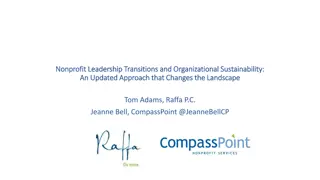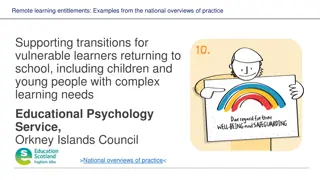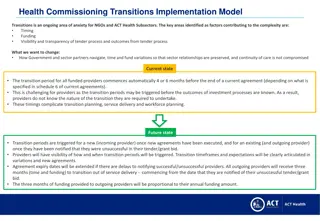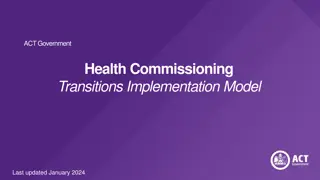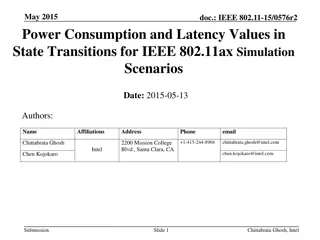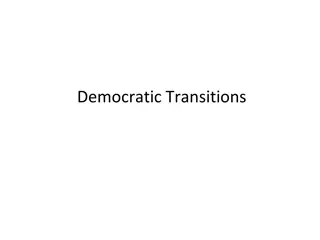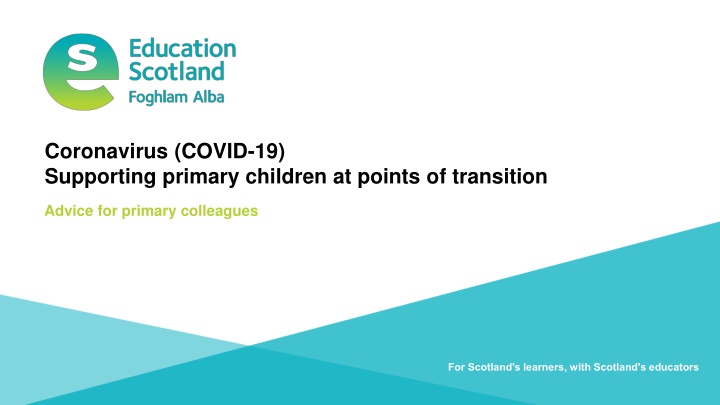
Supporting Primary Children During COVID-19 Transitions in Scotland
"Discover practical advice and nurturing principles for supporting primary children during transitions amidst the challenges of COVID-19 in Scotland. Learn how to plan safe and reassuring transitions that prioritize children's well-being and learning. Stay connected and communicate effectively with children and families during these crucial times."
Download Presentation

Please find below an Image/Link to download the presentation.
The content on the website is provided AS IS for your information and personal use only. It may not be sold, licensed, or shared on other websites without obtaining consent from the author. If you encounter any issues during the download, it is possible that the publisher has removed the file from their server.
You are allowed to download the files provided on this website for personal or commercial use, subject to the condition that they are used lawfully. All files are the property of their respective owners.
The content on the website is provided AS IS for your information and personal use only. It may not be sold, licensed, or shared on other websites without obtaining consent from the author.
E N D
Presentation Transcript
Coronavirus (COVID-19) Supporting primary children at points of transition Advice for primary colleagues For Scotland's learners, with Scotland's educators Transforming lives through learning Document title
The path before us is through uncharted territory and will need careful navigation. Our guiding values should be kindness, compassion, openness and transparency. COVID 19 a framework for decision making Scottish Government: April 2020 For Scotland's learners, with Scotland's educators For Scotland's learners, with Scotland's educators COVID-19 - Supporting primary children at points of transition
Primary transitions in the new context Why is this advice needed for the primary sector? To ensure practitioners have access to practical advice based on what we currently know about best transitions practice, learning from others, and applying this in a Scottish context, To intentionally plan for a safe transition that builds on the learning children bring with them from primary, To provide reassurance that despite the significant impact that Covid-19 is having on all of our lives, we will be doing the right thing for our children if we adopt approaches which are grounded in nurturing principles. For Scotland's learners, with Scotland's educators COVID-19 - Supporting primary children at points of transition
Transitions matter - to me Transitions do matter to children and families, in the new context they matter even more. The traditional induction processes no longer fit with the challenges of Covid-19 but we can still support children s transition from primary to secondary school. We will be doing the right thing for children if HWB and nurturing principles permeate all of our transitions planning. For Scotland's learners, with Scotland's educators For Scotland's learners, with Scotland's educators COVID-19 - Supporting primary children at points of transition
Communication: connecting and reconnecting Communicating visually through digital technology offers children and families an immediate connection. Staying connected and making connections at times of transition can promote children s confidence and self esteem. Children will be curious and ask questions, they will want to know who their new teacher(s) may be, will they keep the same friends etc. we need to listen to their voices. As proposed in the context of early years education, how do we create a pedagogy of dialogue (Malaguzzi) for transitioning primary pupils that includes the voice of the child? Things to think about: Not all of our families will have Wi-Fi and the necessary hardware to keep up in touch with practitioners and teachers. Could we use social stories for all/some transitioning pupils to connect and reconnect previously established communication networks? For Scotland's learners, with Scotland's educators COVID-19 - Supporting primary children at points of transition
Supporting childrens multiple transitions Children may experience more than one horizontal transition in the course of their day-these transitions are part of everyday life. For example, from classroom to dining hall or from school to home As children move from primary to secondary school, this is considered a major vertical transition. In these challenging times we need to consider how best to support children s horizontal and vertical transitions. For Scotland's learners, with Scotland's educators COVID-19 - Supporting primary children at points of transition
Sharing information for P7 S1 transition what you might do .. The use of digital platforms and video conferencing can be utilised to allow staff to have face to face discussions about the children transitioning to high school. This is an approach that many schools have started to use successfully. It is important to ensure that all staff involved have access to professional learning and support around use of these platforms if required. Parents may be able to give updates of the wellbeing of their children and make staff aware of changes to their social and emotional needs. This is particularly crucial given the current context and as always, staff should ensure that conversations around wellbeing are dealt with sensitively. Focused discussion around the wellbeing indicators, close observation and opportunities to link up with a designated staff member may help. In relation to academic progress, schools should continue to use a range of formative and summative assessment strategies to build up an accurate picture of strengths, gaps and areas for further development. Children may have already started to gather information about their interests, strengths and individual circumstances in a portfolio. They may need support and time to complete this. For children who do not have this, they could start to create a P7 to S1 passport detailing areas as outlined above. This could be done on paper or in digital form. OneNote could be used for a whole cohort with dedicated areas for each child to complete. For Scotland's learners, with Scotland's educators For Scotland's learners, with Scotland's educators COVID-19 - Supporting primary children at points of transition
Emotional Support and enhanced transition P7-S1 what you might do .. There are numerous ways that formal and informal information sharing and collaborative planning can take place: Phone calls, video conferencing, team pages and emails are being used effectively by many schools at this time to ensure that all parties have access to relevant information and can share expertise. It will be important to keep parents fully involved in collaborative planning as much as possible. Many parents/carers will be anxious about their child s transition to secondary school and will require reassurance and clarity about the support which will be provided. Approaches to help children to become familiar with, for example, new staff and children and the physical environment can be addressed in the ways outlined in the P7 to S1 transition section. Developing social stories related to transition could help support children. It will be important that the professional needs of staff in relation to supporting pupil wellbeing are audited. Schools may also want to work with different partners to support enhanced transitions, for example, Community Learning and Development. Retrospective celebrations of primary school achievements can be organised at a safe time, and many schools have already used online platforms to collate, share and acknowledge the significance of children s time at primary school. For Scotland's learners, with Scotland's educators COVID-19 - Supporting primary children at points of transition For Scotland's learners, with Scotland's educators
Advice and reflective questions: transitions from primary P7 to secondary S1 - a vertical transition Advice Early communication with parents by phone, email, face to face using digital media. Regular check-ins with families to share concerns, issues etc. Develop a communications plan across clusters, agree a consistent message and protocols for sharing information- collaborate with key players and agencies. Involvement-include parents in any arrangements-seek their views and use these to shape revised transition programmes. Planning ahead, be transparent about the need to change arrangements, responsive and intentional plans. Respond to concerns and acknowledge you don t have all the answers, Be transparent about what can and cannot be done safely to environments Adjust curriculuar programmes to ensure there is enough time for vital post lockdown HWB check ins. Reflective questions How do you provide opportunities for young people to talk and communicate their feelings and needs? What changes to practice in your situation do you need to make to ensure that children/parents are well supported ? How are you involving parents in determining reasonable adjustments to the physical environment to ensure pupils are able to adhere to physical distancing and can still access resources inside and outdoors? To what extent is there collaboration between primary and secondary practitioners which is focused on planning a continuous CfE curriculum experience. Have you adjusted the CfE level planners to ensure young people have increased possibilities to talk, to learn and play outside more often than inside? Transforming lives through learning Document title
Moving from one primary stage to another what you might do .. There are obvious benefits, if it is possible, to avoid unnecessary changes to classroom and teacher. Inviting children s views remotely on changes and plans for the new session would help to give them ownership of their learning environment and address the issue of moving forward rather than going back to what they knew before lockdown aiming for a balance of continuity and progression. Photos and videos can be used effectively to help to introduce, familiarise or remind the children of their classroom and the staff who will be working alongside them. Schools often take this approach to supporting children with additional needs and it can be adapted for wider use. Electronic leaflets or emails with key information around class composition could be circulated to all parents to help to inform them about the process and reduce related anxiety. Perhaps a FAQ resource would provide answers to the most common queries, with a designated staff member addressing any individual concerns via phone or email. School staff will be able to share their most up to date knowledge of children s attainment in person or electronically prior to return. It will be essential that staff use their full range of assessment strategies to ascertain current attainment levels in order to plan future learning. However, children s wellbeing will be at the forefront of all decisions and it may be useful to audit and plan for enhanced professional learning around areas such as nurture, resilience, trauma, bereavement and anxiety. This will help schools to respond to the wide range of needs which may be presented when schools return. For Scotland's learners, with Scotland's educators COVID-19 - Supporting primary children at points of transition For Scotland's learners, with Scotland's educators
Advice and reflective questions: transitions from one primary stage to another Advice Early communication with parents by phone, email, face to face using digital media. Involvement-include parents in any arrangements-seek their views and use these to shape revised transition programmes. Planning ahead, be transparent about the need to change arrangements. Respond to concerns and acknowledge you don t have all the answers, Be transparent about what can and cannot be done safely to the environments (inside and outside) pupils will access-strive for consistency of approach with the needs of the individual in mind. Reflective questions Are there communication systems that keep parents and children well informed about likely moves of classrooms and changes of teachers. How will you adjust practice to include involvement from parents, relevant health care specialists and others who can provide targeted and universal support for parents of children with additional support needs, with EAL, and for families facing multiple barriers including situational poverty related challenges linked to Covid-19? Transforming lives through learning Document title
Considerations for primary transitions Transforming lives through learning Document title
Education Scotland Denholm House Almondvale Business Park Almondvale Way Livingston EH54 6GA T +44 (0)131 244 5000 E enquiries@educationscotland.gsi.gov.uk For Scotland's learners, with Scotland's educators For Scotland's learners, with Scotland's educators COVID-19 - Supporting primary children at points of transition

